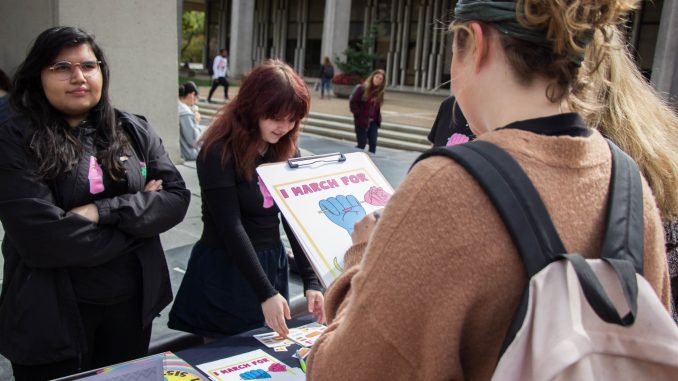
Temple students participated in the #MarchForSisterhood, the world’s first exclusively digital global march, in honor of the International Day of the Girl, an annual day of observance declared by the United Nations to honor girls and women around the world.
Student ambassadors Christina Borst and Daisy Confoy organized a campus-wide initiative on Thursday from 10 a.m. to 2 p.m. at the Bell Tower in partnership with Girls Who Code, an international non-profit organization working to close the gender gap in technology fields.
Organizers and volunteers for the event sat at a table emblazoned with the words “March for Sisterhood” and encouraged passersby to record a video of themselves marching for a cause they care about ranging from immigration to climate change, and share it on social media.
Borst, a senior political science and strategic communication double major, said the digital march is more accessible because it does not have a designated time or place.
“It just goes to show the power of this generation,” Borst said. “A digital march is something that’s very inclusive to young people and caters towards them, especially through the interactions that we have on social media.”
When a male volunteer was tabling the event, more male-identifying students came up to the table to find out what the event was about, said Confoy, a junior political science major.
“Having a man here encouraged other men to stand in solidarity and do something that doesn’t seem masculine,” she added.
Sarah Fitzgerald, a junior sociology major, said she was drawn to the tabling event because she is a “radical feminist.” Fitzgerald posted a video on her Instagram story, marching for abortion rights.
“Women have to have complete control of their body. Period. End of story,” Fitzgerald said.
As an older non-traditional student, Fitzgerald said she finds this initiative particularly important in creating intergenerational relationships among women.
“I’m part of the very end of Generation X and our whole life was consumed with the fight for equality and embracing feminism and reproductive rights. With the rise of technology it has isolated people,” she said.
Sarah Paroya, a junior computer science major who volunteered at the event, said she got involved with the march because of her interest in coding. She said she has noticed a gender gap in this field.
“It hits home for me because this is what I go through,” Paroya said. “When I was in high school, I took a coding class, and I was the only girl and that kind of trend is still prevalent in college.”
Julianne Borst, a sophomore undeclared major, marched for mental health awareness, an issue that she said meant a lot to her.
“I stand for mental health and all the girls who struggle with that and keep going every day,” Borst said. “I’ve dealt with anxiety and depression myself, so just seeing all the women kind of power through that and deal with the same thing is super inspiring and just means a lot to me.”
Confoy, who marched for universal healthcare, said the march is all about women and people of all genders, ethnicities and sexualities uniting around issues they care about.
“It can be awkward walking toward a camera, but when you realize so many women are doing it with you it becomes symbolic,” she said.



Be the first to comment